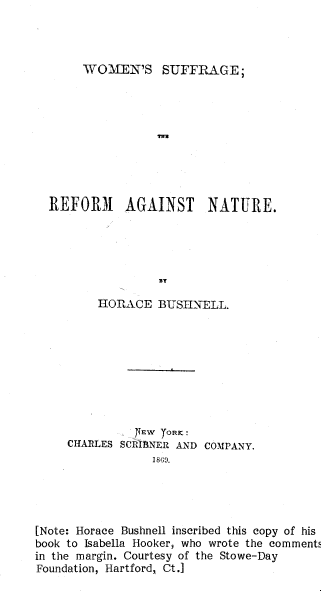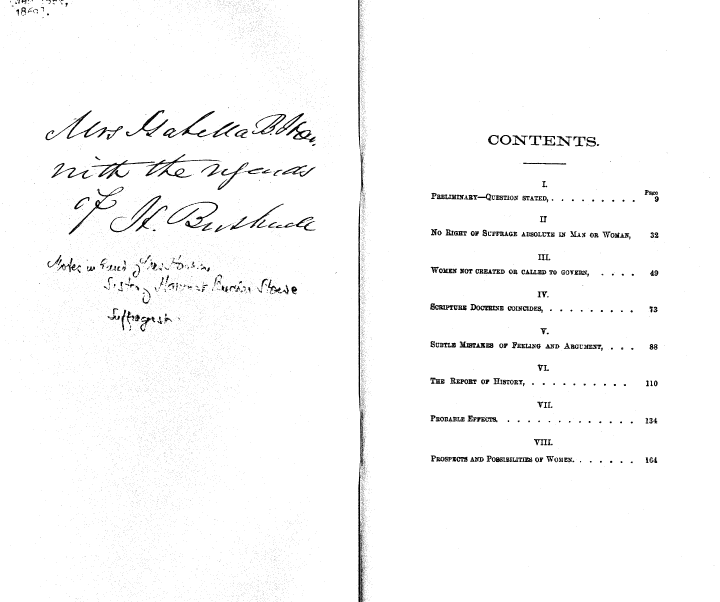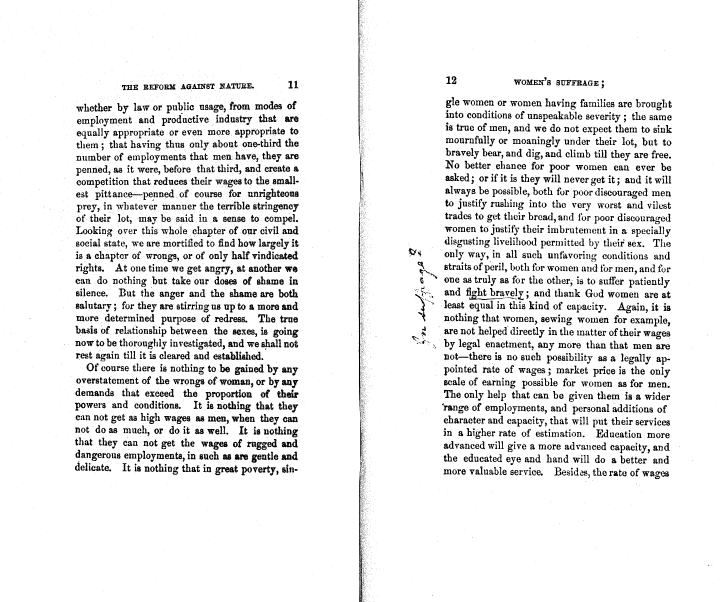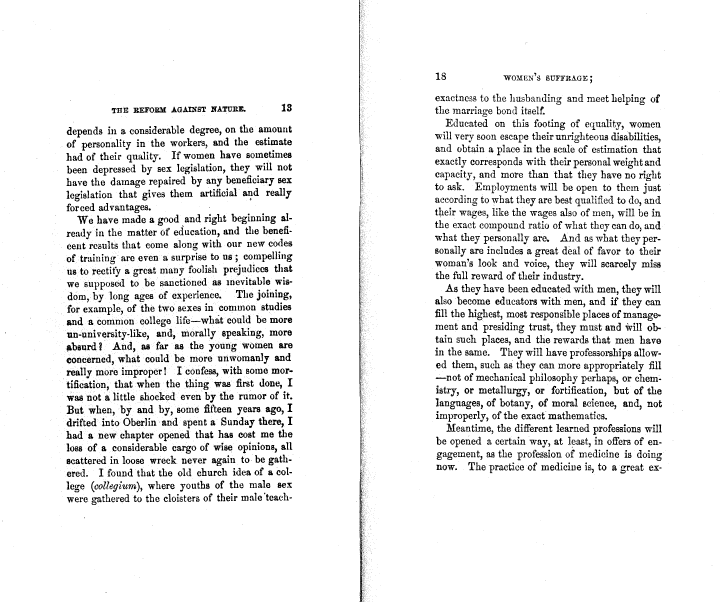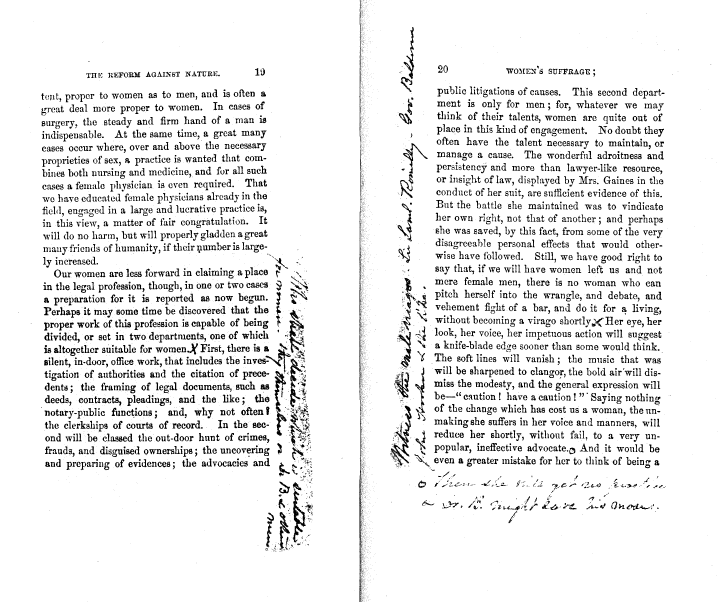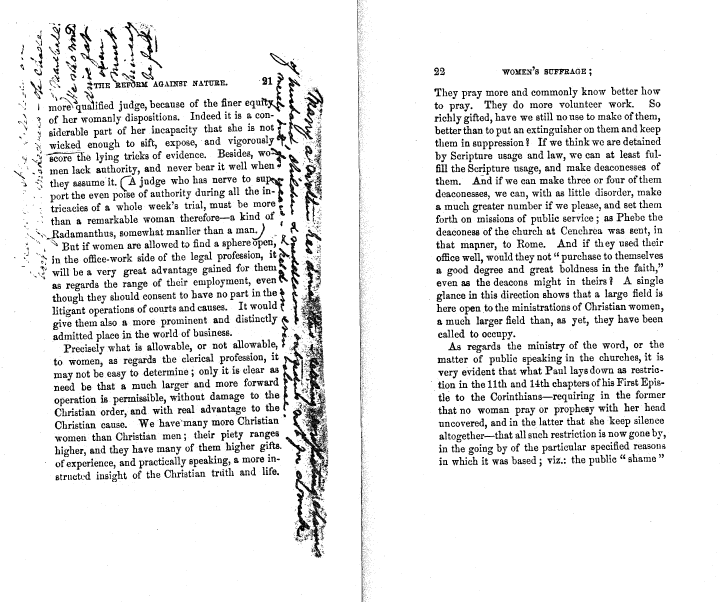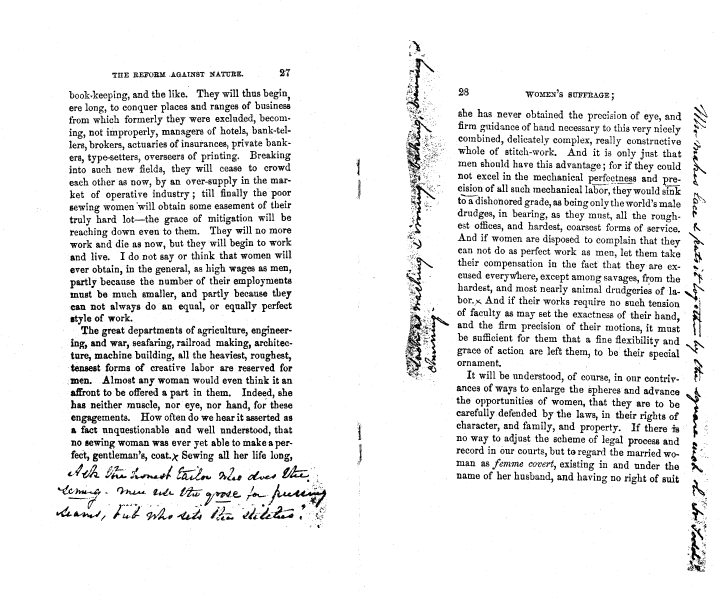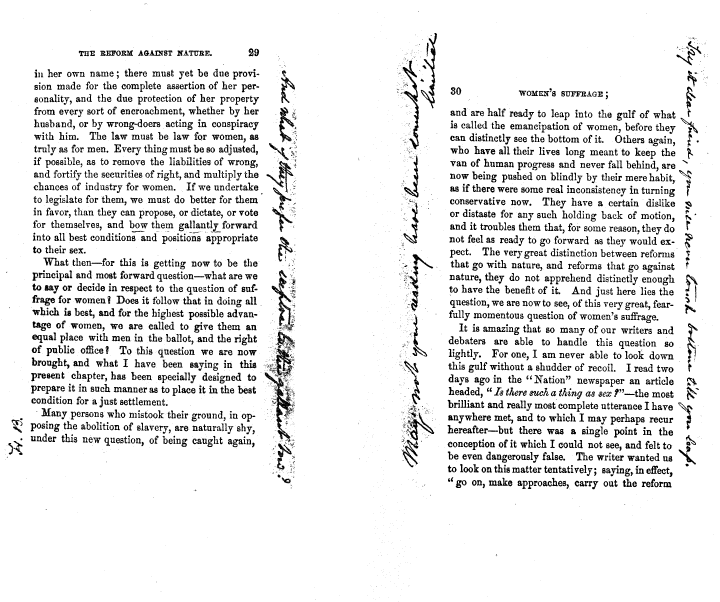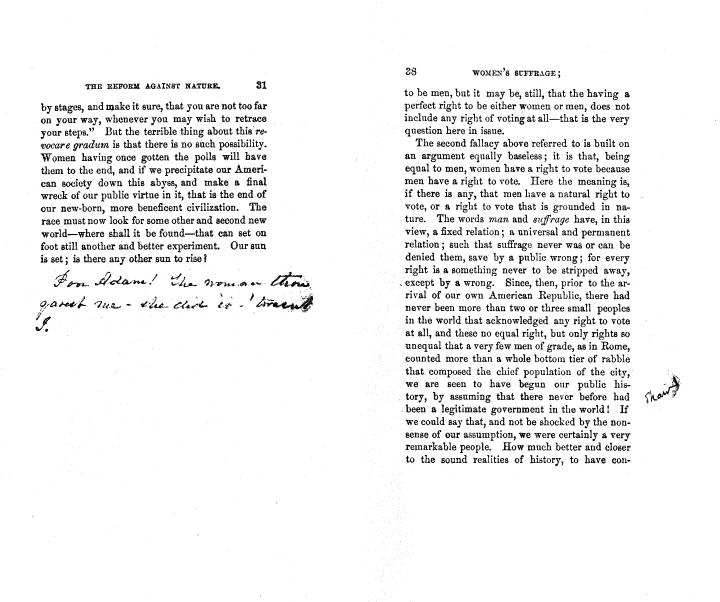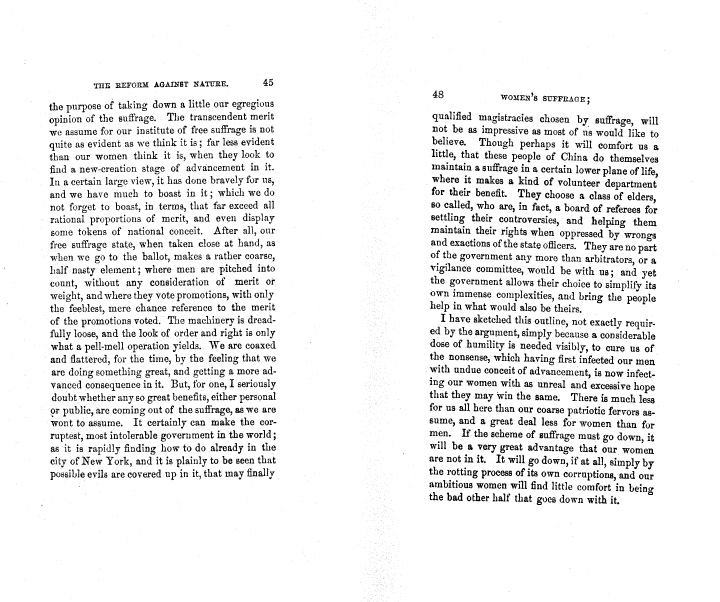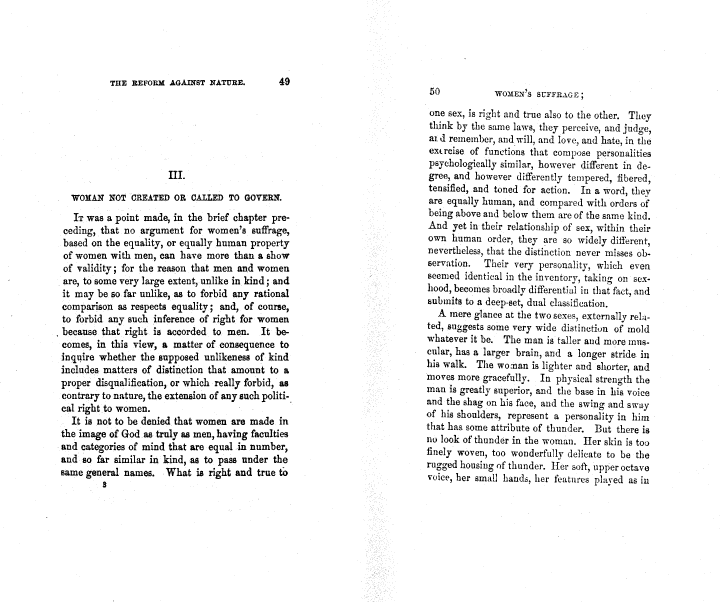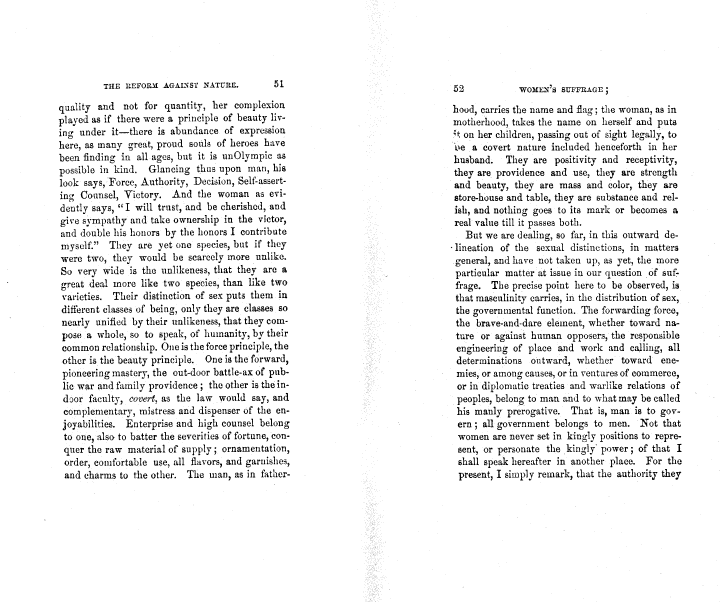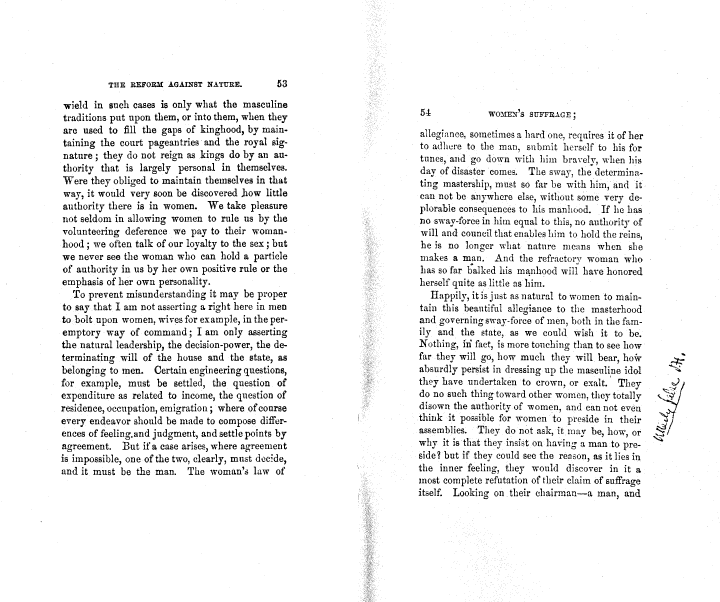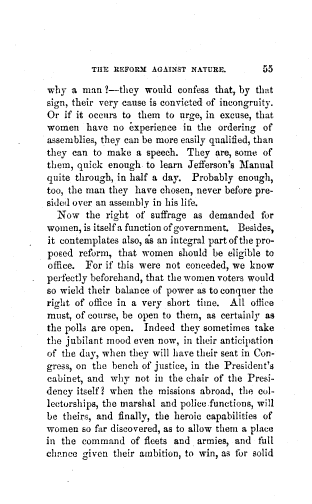|
Horace Bushnell |
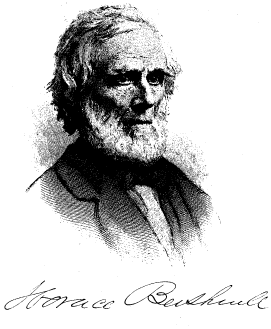
Stowe-Day Foundation, Hartford, Conn. |
It has been my great pleasure to have been acquainted with the Beecher and the Hooker families for some time through my ministry in Hartford. Now I am retired and devote myself to "useless scribbles" now and then, and so, you might guess, it has surprised me that my little book opposing woman suffrage should have received so much attention by the advocates of that "reform against nature." Ah well, it's not as though I am not used to being told I have committed heresy.
I admit to being a true-blue Connecticut Yankee from birth to this present aged state with which God has rewarded me (even before birth, being descended from Francis Bushnell a founder of Guilford in 1639), but I count myself a good deal less stodgy than many I have known in this region. I grew up on a farm in New Preston, brought up primarily by my mother and my father's mother, the eldest in my family. My mother tutored me in life itself from start to finish, training me in correct habits, helping me with my studies, maintaining a religious atmosphere at home, and holding herself as a great example of dignity and perseverance in a harsh world. She refused to be broken by the drudgery of farmwifery, and looked at the world, even in its darkest moments, with great fondness and hope for the future. My grandmother, a converted and confirmed Methodist, was no less the optimist. It was in this environment that I learned to love God's creation.
At 18 I entered Yale College and graduated in 1827. From there I went to teach school in Norwich briefly, then to New York to write for the Journal of Commerce, and then back to Yale to tutor and study the law. 1831 was a year of great religious revivals at Yale, and I was not immune to their enrapturing spirit. I soon found myself in the Divinity School, studying hard to become a minister, even though the "new Divinity," stressing logic over inspiration somewhat troubled me. I was ordained pastor of the North Church of Hartford, and soon married Miss Mary Apthorp of New Haven, herself a descendent of the great John Davenport.
My health was not good early in my ministry, but my congregation was supportive and seemed to appreciate my preaching. Then, in 1849, I had a great spiritual experience, most uplifting and invigorating. In one evening I came to understand the true nature of religion - that it is entirely personal, and that the covenant one shares with God is not anything that can be written or reasoned or determined by logic. Indeed, it is a feeling that each individual can only know in his heart through inspiration from the Word in the Bible, entirely spiritual, incapable of being put into words. I began speaking and writing of these feelings, and was achieving some notoriety through the books I had published. Some of the older members of the profession, of course, charged me with heresy.
In 1856 my health again took a turn for the worse, and I resigned my pastorate to travel to California to see if a new climate could improve me. It was not long, though, before I was back in Hartford, writing and publishing as much as I could, not only on religion, but also on various national issues. There was much hatred in the air in those days, and I felt compelled to do what I could with my humble pen to dispel some of it. While I thought Congress had made a serious mistake in passing the Fugitive Slave Law so that escaped slaves could be hunted down like dogs, I did not associate myself with the abolitionist movement. Those crusaders seemed to embody no less hatred than the slave holders themselves, using scriptural justification for the most violent and lawless actions.
My religious tracts became quite popular among some of the younger generation of ministers of the gospel, and some of the most famous of these, including Henry Ward Beecher, would give expression to my ideas from their pulpits. Yet, now I find I have offended another member of that illustrious clan, Mrs. Isabella Beecher Hooker. In 1869 I published Women's Suffrage: the Reform against Nature, in which I argued that giving women the vote was altogether unsuitable, and that women had a calling far higher and more significant than participation in politics. There are many women who agree with me, and, in fact, the most significant woman in my life is a perfect example of what I was speaking about. Mrs. Hooker, however, has cast her lot with the radical woman reformers who, in the name of dear "equality" hope to bring women into every dreary and rough department of life now occupied by men. Alas, poor women! These reformers have such a romantic vision of the base existence of our half of the species.
Thankfully, there is great opposition to woman suffrage in this society, although hardly from the sort I would care to identify myself with, or for the reasons I would give. I certainly feel that women in this society are oppressed and that the society, indeed, could be better served with more women in occupations that are now monopolized by men. The suffrage is not the answer, though; in fact, I see it as only further demeaning women. I expressed these sentiments clearly in my book and look forward to clearing up any misunderstandings they may have caused when I converse with Mrs. Hooker.
